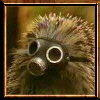
Rating: 5 out of 5
The first of a series of novels, few sci-fi books come as good as this one. Few sci-fi authors even come close to the imagination of Frank Herbert. No other world (sci-fi or otherwise) will ever imprint itself to the human mind the way does the novel's lonely, dry and harsh desert planet. The planet Dune will haunt you.
Set tens of thousands of years in the future, Dune is the story of the young Paul Atreides, heir apparent to the House Atreides. He finds himself caught up in the byzantine and deadly power struggle between his family’s house and that of House Harkkonen. Trouble begins to escalate as the House Atreides takes over the rule of the planet Arrakis (also known as Dune), where the family relocates therefore giving them control of the most important planet in the system. Arrakis is the only source of the all-important spice melange, which is practically the lifeblood of society as a whole. Melange, among other things, can give extended life and increased awareness and mental capacity to those who ingest it. It is also the most necessary component of space travel as melange is needed for pilots to guide their spacecraft through the “folds” of space.
Naturally, the Atreides relocation move is opposed by House Harkkonen, who with the help of the Emperor, launch a suprise attack on Dune that sends the boy Paul and his mother into the desert and into the hands of the enigmatic tribe of human warriors known as the Fremen. Among them, Paul, who may have the ability to “see” visions of the future, learns of a local prophesy about the coming of a Messianic figure, the Muad’dib who will one day transform Arrakis into a paradise. And to Paul’s horror, he and the Fremen come to realize that he might just be the Muad’dib himself. Paul desperately tries to avoid fulfilling the prophesy, since in his visions, the coming of Muad’dib would also unleash a holy war or jihad across the galaxy that will result in the mass slaughter of millions.
In Dune, Frank Herbert creates a world of terrible and deadly beauty filled with super-powerful sandstorms, brave smugglers, deadly warriors and majestic giant sandworms. Dune, as a planet is as much a character as any person in the story and probably the greatest character in the whole series of the Dune novels. The planet comes alive in the pages of the book. In it, Herbert brings to front the ecology which depicts man’s struggle against his environment and vice-versa. How do the surroundings affect the development of human society and his culture? How does man affect the environment in his struggle to survive? Dune, the novel, is said to be the first great ecological novel. Herbert also presents to his reader the question of man’s dependence on one product to support his way of life. The spice melange becomes an analogy of petroleum and present-day man’s dependence on it.
The author also creates a mesmerizing society which is heavily influenced by Arabic culture in terms of customs and language. But he also mixes some touches of Zen Buddhism, Christianity, Islam and Zionism giving the novel a quasi-religious feel. One can suspect the possibility that Herbert may be examining the roles of ancient prophets and their part in the evolution of religion and their effects on human society and politics throughout our history.
More themes are explored in the book like substance addiction, human potential, evolution and breeding, free will and destiny, aspects of leadership, and much more. It was the themes that made the novel fascinating. But these would amount to little if it is not as beautifully written as it is by Frank Herbert. One can only compare the effort made by his son, Brian Herbert and Kevin J. Anderson when they tried to continue Frank’s story after his death, and see the huge difference in quality in the way their works were written (and it is strongly suggested to think it over before deciding to read the Dune "expanded universe" books of BH and KJA, which, while readable and probably entertaining to some, might be a hugely disappointing excercise.) Frank Herbert gives his readers profound ideas and ingenious settings, makes them think and imprints lasting images on their minds. And he presents them in such a lyrical way that his science fiction almost reads like fantasy.
Dune and the succeeding books make one of the best sci-fi stories of all time. It won the Nebula Award in 1965 and shared the Hugo Award in 1966. For many, it is the greatest sci-fi novel ever. Often compared to J.R.R. Tolkien’s The Lord of the Rings, no sci-fi universe can ever compare to it (with sincere apologies to George Lucas). Herbert has written the book that still stands the test of time in terms of the story, literary style and speculative concepts. He concentrated on a setting and perceived future which focused on the humanity aspects instead of technological advancement, where he was deliberatly vague on the subject - except that thinking machines (computers) were banned in his universe. This stroke of genius has prevented the novel from becoming, unlike earlier works of science fiction, outdated or too over-the-top and is one of the factors that has made his story forever enduring. Dune will always be considered one of the world’s classics of literature. And rightfully so.


No comments:
Post a Comment